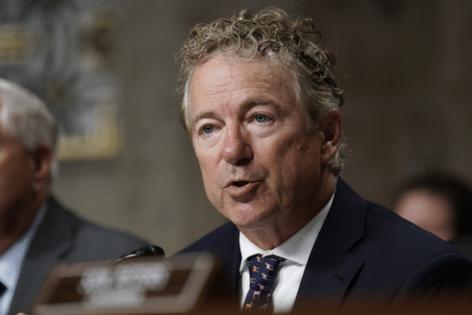True to form, Kentucky Sen. Rand Paul again opposes defense authorization bill
Published in Political News
WASHINGTON — Rand Paul was one of just 14 senators and three Republicans to vote against the annual bill passed by Congress on Wednesday that decides how the U.S. armed forces are funded for the coming year.
It passed easily 85-14, with support from Kentucky’s senior senator, Mitch McConnell.
Paul has routinely opposed the National Defense Authorization Act, expressing concerns about sweeping powers that infringe on civil liberties, like the Foreign Intelligence Surveillance Act, which allows the collection of communications data from foreigners abroad.
But this year Paul took to the Senate floor to protest the gradual evolution of emergency powers controlled by the executive branch, which Paul said has effectively turned the United States into “a monarchy in disguise.”
“This dangerous imbalance of the constitutional separation of powers is not simply aggrandizement by the executive branch,” Paul said in a speech. “Congress has essentially made itself a feckless branch of the federal government by granting the president so many emergency powers and refusing to regularly vote on the termination of national emergencies as required by current law.”
Paul pointed to the NDAA as a vehicle for continuing to grant unchecked emergency powers to the president, no matter their party. For instance, there are more than three dozen active national emergencies, some dating back to the 1970s.
He introduced a bill that would require a president’s declaration for a national emergency to automatically expire after 30 days unless approved by Congress, restoring legislative authority and limiting executive overreach. While the bill has cleared a key Senate committee, it has not garnered support from the full Senate.
During Donald Trump’s first term, Paul opposed the president’s move to declare a national emergency to secure funding to build a wall along the southern border that Congress would not allocate. In December 2023, he was among the 13 senators who voted against the fiscal 2024 defense policy bill.
“The other name for emergency rule is martial law. It’s something all of us should object to and say that should only happen in an exceptional case,” Paul said.
But Paul’s point of view lost out to that of McConnell, who wanted an even higher topline number for defense priorities but praised the legislation as a “compromise product.”
The NDAA will include a $138 million provision to establish a state-of-the-art aviation facility at Fort Knox and bolster Kentucky-based manufacturers that supply its defense industrial base. McConnell also secured a new interstate authority for Tricare providers to expand mental health care access to service members at Fort Knox, Fort Campbell and Blue Grass Army Depot.
“I’m especially proud this bill expands telehealth services for service members across state lines, so our nation’s heroes and their families have ready access to the care they need,” McConnell said.
The Senate’s final approval of the mammoth $895 billion defense spending bill on Wednesday afternoon clears the way for President Joe Biden’s signature. It includes a double-digit pay raise for junior service members and bans coverage for transgender health procedures for minors, a provision that spurred the opposition of some Democrats.
_____
©2024 McClatchy Washington Bureau. Visit mcclatchydc.com. Distributed by Tribune Content Agency, LLC.




























































Comments